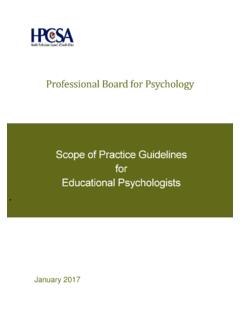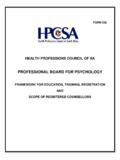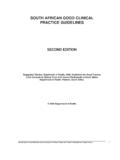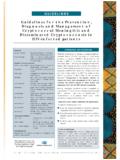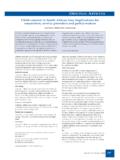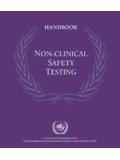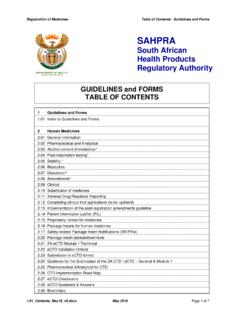Transcription of HEALTH PROFESSIONS COUNCIL OF SOUTH AFRICA
1 HEALTH PROFESSIONS COUNCIL OF SOUTH AFRICA guidelines FOR good PRACTICE IN THE HEALTH CARE PROFESSIONS GENERAL ETHICAL guidelines FOR THE HEALTH CARE PROFESSIONS EDITED BY THE HUMAN RIGHTS, ETHICS AND PROFESSIONAL PRACTISE BOOKLET 1 PRETORIA MAY 2008 HEALTH PROFESSIONS COUNCIL of SOUTH AFRICA Post Office Box 205 Pretoria 0001 Telephone: (012) 338 9300 Fax: (012) 328 4863 E-mail: Website: iTHE SPIRIT OF PROFESSIONAL guidelines Practice as a HEALTH care professional is based upon a relationship of mutual trust between patients and HEALTH care practitioners. The term profession means a dedication, promise or commitment publicly made .1 To be a good HEALTH care practitioner, requires a life-long commitment to sound professional and ethical practices and an overriding dedication to the interests of one s fellow human beings and society.
2 In essence, the practice of HEALTH care PROFESSIONS is a moral enterprise. In this spirit the HPCSA presents the following ethical guidelines to guide and direct the practice of HEALTH care practitioners. These guidelines form an integral part of the standards of professional conduct against which a complaint of professional misconduct will be evaluated. [Note: The term HEALTH care practitioner in these guidelines refers to persons registered with the HPCSA]. 1 Pellegrino, ED. Medical professionalism: Can it, should it survive? J Am Board Fam Pract 2000; 13(2):147-149 (quotation on p. 148). ii TABLE OF CONTENTS Acknowledgements .. iii 1. Introduction .. 1 2. Core ethical values and standards for good practice .. 2 3. How to resolve ethical dilemmas.
3 3 4. What it means to have a duty .. 4 5. Duties to patients .. 5 6. Duties to colleagues and other HEALTH care practitioners .. 8 7. Duties to patients of other HEALTH care practitioners .. 9 8. Duties to themselves .. 9 9. Duties to 10 10. Duties to the HEALTH care profession .. 10 11. Duties to the environment .. 10 iiiACKNOWLEDGEMENTS The HEALTH PROFESSIONS COUNCIL of SOUTH AFRICA wishes to thank the following persons for their contributions towards developing these guidelines : The Committee for Human Rights, Ethics and Professional Practice of the HPCSA for initiating and advising the review process. Mr P. Noe (Chairperson), Prof A. Dhai, Prof London, Prof S. Singh, Prof M Dada, Ms M Kekana, Adv Shishuba, Dr F. Randera, Prof Y. Veraiwa and the HPCSA Registrar Adv B Mkhize Prof D Knapp van Bogart (Steve Biko Centre for Bioethics, University of the Witswatersrand), for drafting the guidelines for the booklet on Telemedicine.
4 Prof A. Dhai, Prof McQuoid-Mason, Dr N Msomi and LIFElab for the development of the ethical guidelines for Biotechnology Research in SOUTH AFRICA . Prof D. J McQuoid-Mason for his editorial advice on the booklets Chief Operations Officer, Mr Thabiso Molokomme, Mr Itumeleng Malao, and Mr Michael Kekana GENERAL ETHICAL guidelines FOR THE HEALTH CARE PROFESSIONALS 1. INTRODUCTION Being registered as a HEALTH care professional with the HEALTH PROFESSIONS COUNCIL of SOUTH AFRICA (HPCSA) confers on us the right and privilege to practise our PROFESSIONS . Correspondingly, practitioners have moral or ethical duties to others and society. These duties are generally in keeping with the principles of the SOUTH African Constitution (Act No. 108 of 1996) and the obligations imposed on HEALTH care practitioners by law.
5 This first booklet on general ethical guidelines contains value-oriented principles and express the most honourable ideals to which members of the HEALTH care profession should subscribe in terms of their conduct More specific ethical guidelines and rules are derived from these general ethical guidelines . They offer more precise guidance and direction for action in concrete situations. They also make it possible for the HPCSA to implement sanctions against transgressors. It is impossible, however, to develop a complete set of specific ethical prescriptions applicable to all conceivable real-life situations. In concrete cases, HEALTH care professionals may have to work out for themselves what course of action can best be defended ethically.
6 This requires ethical reasoning. This booklet lists thirteen core ethical values and standards that underlie professional and ethical practice in HEALTH care PROFESSIONS , and gives a short explanation of how one makes practical decisions through ethical reasoning. It then explains what a duty is, and catalogues the general ethical duties of HEALTH care professionals [Note: In this booklet, the expressions professional or practitioner are used interchangeably to refer to HEALTH care practitioners]. 2 2. CORE ETHICAL VALUES AND STANDARDS FOR good PRACTICE Everything ethically required of a professional to maintain good professional practice is grounded in core ethical values and standards the latter are the directives that follow the core values. These core values and standards are presented as a linear list for the sake of simplicity.
7 In concrete cases, the demands of these core values and standards may clash, thus making competing demands on HEALTH care practitioners. The only way to address such clashes is through ethical reasoning. The core ethical values and standards required of HEALTH care practitioners include the following: Respect for persons: HEALTH care practitioners should respect patients as persons, and acknowledge their intrinsic worth, dignity, and sense of value. Best interests or well-being: Non-maleficence: HEALTH care practitioners should not harm or act against the best interests of patients, even when the interests of the latter conflict with their own self-interest. Best interest or well-being: Beneficence: HEALTH care practitioners should act in the best interests of patients even when the interests of the latter conflict with their own personal self-interest.
8 Human rights: HEALTH care practitioners should recognise the human rights of all individuals. Autonomy: HEALTH care practitioners should honour the right of patients to self-determination or to make their own informed choices, and to live their lives by their own beliefs, values and preferences. Integrity: HEALTH care practitioners should incorporate these core ethical values and standards as the foundation for their character and practice as responsible HEALTH care professionals. Truthfulness: HEALTH care practitioners should regard the truth and truthfulness as the basis of trust in their professional relationships with patients. Confidentiality: HEALTH care practitioners should treat personal or private information as confidential in professional relationships with patients - unless overriding reasons confer a moral or legal right to disclosure.
9 Compassion: HEALTH care practitioners should be sensitive to, and empathise with, the individual and social needs of their patients and seek to create mechanisms for providing comfort and support where appropriate and possible. Tolerance: HEALTH care practitioners should respect the rights of people to have different ethical beliefs as these may arise from deeply held personal, religious or cultural convictions. Justice: HEALTH care practitioners should treat all individuals and groups in an impartial, fair and just manner. 3 Professional competence and self-improvement: HEALTH care practitioners should continually endeavour to attain the highest level of knowledge and skills required within their area of practice. Community: HEALTH care practitioners should strive to contribute to the betterment of society in accordance with their professional abilities and standing in the community.
10 3. HOW TO RESOLVE ETHICAL DILEMMAS The core values and standards referred to above are the foundation that grounds the general ethical guidelines in these booklets. Being general, such guidelines may be applied to many different concrete cases. Questions arise as to how HEALTH care practitioners may use these guidelines to make practical decisions or choices about the provision of HEALTH care. For example, how does a guideline apply in a specific case? And, how do HEALTH care practitioners handle difficult situations where two (or more) principles appear to be in conflict? Briefly, what is needed is ethical reasoning. In general, such ethical reasoning proceeds in four steps: Formulating the problem: Determine whether the issue at hand is an ethical one once this has been done it must be decided whether there is a better way of understanding it.
